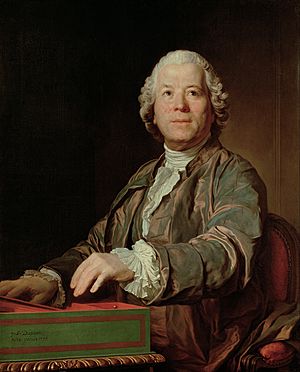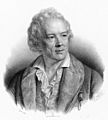Christoph Willibald von Gluck facts for kids
Christoph Willibald Ritter von Gluck (born July 2, 1714, died November 15, 1787) was a famous German composer. He is best known for his operas. Gluck changed the way operas were written. He wanted them to be exciting stories, not just a collection of songs.
His new ideas had a big impact on other composers. Musicians like Mozart and Wagner learned from him. Gluck wrote operas in both Italian and French. One of his most famous songs is “Che farò senza Euridice” from the opera Orfeo ed Euridice. It is still one of the best-known opera songs today.
Contents
Who Was Christoph Willibald Gluck?
Christoph Willibald Gluck was born in a small town called Erasbach. This was near Berching, in what is now Germany. He grew up in a time when music was very important. Many composers were writing new and exciting pieces.
Gluck's Early Life and Training
Gluck's father worked as a forester. This meant he managed forests. Young Gluck went to school in Komotau. There, he learned about music and played instruments. He also studied at the University of Prague.
After his studies, Gluck traveled a lot. He went to Vienna, Austria, which was a big music center. He also visited Italy. In Italy, he learned even more about opera. He wrote his first opera there in 1741.
Changing Opera Music
In Gluck's time, many operas were very fancy. Singers would often show off their voices. They would sing long, difficult songs called arias. Sometimes, these songs didn't help the story. Gluck thought this was a problem.
He wanted opera to be more dramatic. He believed the music, singing, and story should all work together. This way, the audience would feel the emotions of the characters. He wanted the music to serve the story.
Gluck's Opera Reforms
Gluck started to change opera in the 1760s. He worked with a writer named Ranieri de' Calzabigi. Together, they created new kinds of operas. Their first big success was Orfeo ed Euridice in 1762.
In these new operas, the music was simpler. The songs flowed more naturally into the story. The singing was less about showing off. It was more about expressing feelings. The orchestra also played a bigger role. It helped to set the mood and tell the story.
Gluck also made the ballet parts important. They were not just separate dances. They helped to move the story forward. This made the whole opera feel more connected.
Famous Operas by Gluck
Gluck wrote many important operas. Some of his most famous include:
- Orfeo ed Euridice (1762)
- Alceste (1767)
- Paride ed Elena (1770)
- Iphigénie en Aulide (1774)
- Armide (1777)
- Iphigénie en Tauride (1779)
These operas were performed in big cities. They were popular in Vienna and Paris. Gluck's ideas spread across Europe. They helped shape the future of opera.
Gluck's Later Life
Gluck spent much of his later life in Vienna. He continued to compose and teach. He became very respected for his work. He died in Vienna in 1787.
His legacy lives on. Many composers after him used his ideas. He showed that opera could be a powerful art form. It could tell deep stories and move people's hearts.
Images for kids
-
Johann Franz Greipel – Il Parnaso confuso by Christoph Willibald Gluck (music) and Pietro Metastasio (libretto). Performed on 24 January 1765 by the children of Maria Theresia: Maria Amalia (Apollo), Maria Elisabeth (Melpomene), Maria Josepha (Euterpe), Maria Karolina (Erato), Leopold (Harpsichord)
-
Carmen Lavani in Le cinesi (1973). The work is very much in the vein of the chinoiserie so popular in its time. Le cinesi reflects cultural overlap between the Austrian court and the distant Chinese court. In Le cinesi, Metastasio gives a lesson on the different forms of theatre: pastoral, comedy and tragedy.
-
Gluck in Paris 1777, by Étienne Aubry, Louvre
See also
 In Spanish: Christoph Willibald Gluck para niños
In Spanish: Christoph Willibald Gluck para niños
 | William M. Jackson |
 | Juan E. Gilbert |
 | Neil deGrasse Tyson |














